HOW CAN WE HELP YOU? Call 1-800-TRY-CHOP
In This Section
Vaccine Symposium, Best Pediatrics Program, Pediatric Opioid Prescriptions, Biomedical Research Award

mccannn [at] chop.edu (By Nancy McCann)
As April warms up so does the coverage of research from Children's Hospital of Philadelphia. Check out this week's research headlines to discover which two CHOP doctors receive prestigious biomedical research awards. Read on to learn about the inaugural Penn-CHOP-Wistar Vaccine Symposium and which pediatrics program is best in the United States (hint: CHOP!). More news covers a study on the decline of opioid prescriptions for pediatric patients after surgical procedures.
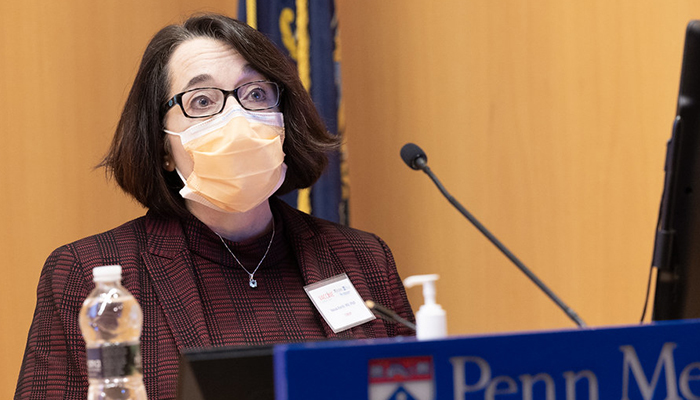
Susan Furth, MD, PhD
Penn-CHOP-Wistar Vaccine Symposium Highlights Rich History of Vaccine Innovation
Hundreds of scientists gathered in Philadelphia and virtually in March for the inaugural Penn-CHOP-Wistar Vaccine Symposium, which highlighted the groups' rich history of vaccine innovation, their cutting-edge vaccine scientists, and their capacity as global leaders in vaccinology.
Susan Furth, MD, PhD, executive vice president and chief scientific officer of CHOP Research Institute, opened the Symposium, and Stanley Plotkin, MD, professor emeritus of University of Pennsylvania's Perelman School of Medicine, a former director of CHOP's Division of Infectious Diseases, and co-creator of vaccines for rubella and rabies, gave the morning keynote address reviewing the history of vaccine technology.
Of the 16 notable speakers, several were from CHOP including Jeffrey Gerber, MD, PhD, associate chief Clinical Research Officer at the Institute, and Paul Offit, MD, director of the Vaccine Education Center at CHOP and co-inventor of a landmark vaccine achievement for the prevention of rotavirus. Drs. Gerber and Offit talked about COVID-19 vaccines for children.
Leyuan Ma, PhD of the Department of Pathology and Laboratory Medicine gave his talk during the "Vaccine Design, Adjuvants, and Delivery Systems" session, and Laura Vella, MD, PhD, of the Division of Infectious Diseases and one of the Symposium organizers, spoke during the session "Determinants of Vaccine-induced Immunity" with a speech titled "Vaccine Readiness after Immune Reconstitution."
"The opportunity to hear from basic scientists, clinical researchers, and policymakers was invaluable and highlighted the broad impact of Penn and CHOP on the field," Dr. Gerber said.
Near the end of the day, a roundtable discussion highlighted infrastructure needs to expand and accelerate translational research, which align well with the groups' established and emerging capabilities.
"Now, more than ever, in-person events where vaccine researchers share ideas are critical," Dr. Offit said.
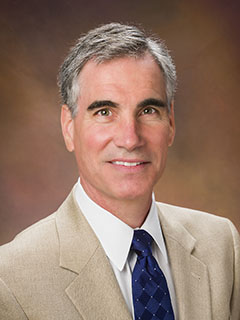
Joseph St. Geme, MD
And the 2022 Best Pediatrics Program in the United States Goes to …
The Department of Pediatrics at Children's Hospital of Philadelphia and the Perelman School of Medicine at the University of Pennsylvania ranked No. 1 by U.S News & World Report. The rankings were based on ratings by medical school deans and senior faculty at peer schools on factors such as primary care rates, MCAT scores, faculty/student ratio, and research activity. After CHOP, Harvard University was ranked second, the University of Cincinnati took third place, with Johns Hopkins University in fourth.
CHOP's Department of Pediatrics is highly regarded, nationally and internationally, and is consistently named among the premier academic pediatric departments in the United States. It strives to be the world leader in advancing healthcare for children and adolescents and does this by integrating excellent patient care, innovative research, cutting-edge professional education programs, and timely advocacy for the pediatric population. Over the past decade, the department has continued to grow in breadth and depth of clinical programs, research activity, and education initiatives.
"This ranking as the top Department of Pediatrics in the country is a tremendous honor and is a reflection of the enormous talent among the faculty, the trainees, and the staff across the Department of Pediatrics and all of CHOP," said Joseph St. Geme, MD, chair of the Department of Pediatrics. "Our track record in delivering outstanding care for patients and families, advancing child and adolescent health through cutting-edge research, and providing education programs that facilitate development of the next generation of pediatric leaders fills me with pride."
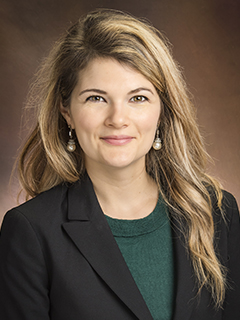
Tori Sutherland, MD, MPH
Significant Drop in Opioid Scripts for Pediatric Patients After Surgical Procedures
CHOP researchers found that opioid prescriptions for children who underwent one of eight common outpatient surgeries declined, in a study assessing trends in postoperative opioid prescribing over a five-year period. The findings, published in Pediatrics, suggest clinicians are using more discretion when considering which pediatric patients require an opioid prescription after their procedures.
The researchers used data from a private insurance database to study opioid-naïve patients (those who are not chronically receiving opioids on a daily basis) under 18-years-old who underwent one of eight surgical procedures between 2014 and 2019. The procedures ranged from tonsillectomies and dental surgeries to removal of the appendix and knee surgery. The cohort of nearly 125,000 patients were separated by age into three age groups: adolescents, school-aged children and preschool-aged children.
The results showed that the percentage of children who had an opioid prescription filled after their surgery dropped in all three age categories. For adolescents, prescriptions dropped from 78% to 48%; for school-aged children, from 53% to 25%; and for preschool-aged children, from 30% to 11%. The average morphine milligram equivalent dispensed declined by approximately 50% across all three age groups.
"The study identified that pain treatment for children and adolescents undergoing surgery has changed dramatically over the past five years," said lead author Tori Sutherland, MD, MPH, an attending anesthesiologist in the Department of Anesthesiology and Critical Care Medicine. "Understanding what these trends mean for a child's experience and health outcomes is an important next step."
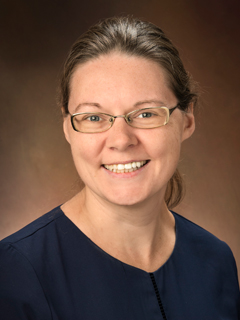
Elizabeth Bhoj, MD, PhD
Two CHOP Docs Receive Prestigious Biomedical Research Award
Congratulations go out to CHOP researchers David Hill, MD, PhD, of the Division of Allergy and Immunology, and Elizabeth Bhoj, MD, PhD, with the Division of Human Genetics — two of only 10 investigators recognized nationwide to receive the prestigious 2021 Hartwell Individual Biomedical Research Award. Through this award, the Hartwell Foundation provides funding for innovative, early-stage biomedical research with the potential to benefit children of the United States. It specifically seeks to fund innovative and cutting-edge applied research that has not yet qualified for funding from traditional outside sources. Each Hartwell Investigator receives support for three years at $100,000 direct cost per year.
The Bhoj Lab's genetics research aims to discover new human disease genes, their mechanisms, and potential targeted therapies. In addition to ongoing gene discovery efforts, Dr. Bhoj focuses on three novel genes that lead to pediatric neurologic dysfunction: TBCK, H3F3A/B, and MAP4K4TBC1. She received the grant for her research titled "Epigenetic Diagnosis and Targeted Treatment for Improving Cognitive Outcomes in Neurodevelopmental Disorders."
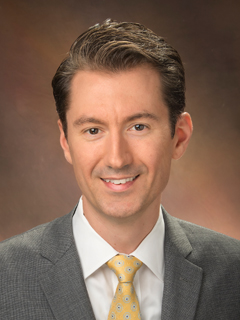
David Hill, MD, PhD
Dr. Hill's award-winning research is "Food-Specific Memory T Cell Responses for Diagnosis and Monitoring of IgE-Independent Eosinophilic Esophagitis." The Hill Lab is developing new clinical tests that detect food-specific immune cells in the blood of patients. These tests will help doctors identify foods that are causing an individual's allergy and streamline the development of personalized food elimination diets.
"The Hartwell award will allow us to expand and extend our research in this area at a critical stage," Dr. Hill said, "while accelerating the timeline to bring these tests into clinical use."
ICYMI
Catch up on our headlines from our April 1 In the News:
- Philadelphia Regional Center for Children's Environmental Health a First for the Region
- Karen M. Puopolo, MD, PhD, Named Pennsylvania Pediatrician of the Year
- Elaine H. Zackai, MD, Receives Lifetime Achievement Award in Medical Genetics
- 'Women Leading the Way:' A Five-episode Special Podcast Series
Keep up with our news, stories, and updates in real time by following us on Twitter, Facebook, LinkedIn, or Instagram. Or subscribe to our newsletter to get an email sent every other Friday by signing up here.

